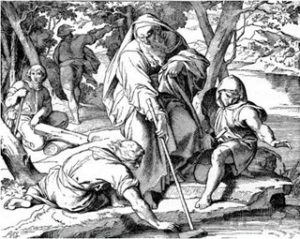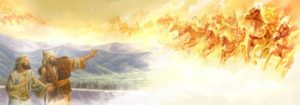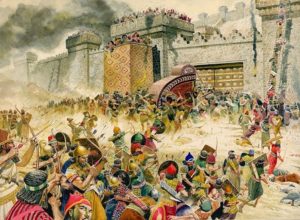TODAY’S READING FROM THE OLD TESTAMENT- 2 KINGS 6:1-7:20
We have already learned that Elisha was concerned for the welfare of the future generation. We should be also!
Elisha wanted to be sure that people were equipped with the Word of God. He had been meeting with a company of prophets (2 Kings 4:38), and it eventually turned into a school of prophets.
There were schools for prophets in Gilgal, Bethel, Jericho, and in Ramah.
As Elijah trained Elisha, now Elisha trains the next generation. In the New Testament, the Apostle Paul trained Timothy and commands him to train faithful, available and teachable believers.
2 Timothy 2:2 2 The things which you have heard from me in the presence of many witnesses, entrust these to faithful men who will be able to teach others also.
Elisha’s students are eager to study, but they need a larger assembly hall for their meetings. So they propose to build a larger facility and ask permission to retrieve timber from the banks of the Jordan.
The students beg their teacher to come with them. It is a good thing he did. Elisha did a lot of teaching outside the classroom. What happened next is as instructive for us as it was for the school of the prophets.
The students need more than Elisha’s permission for the project. They need his accompanying presence.
Jesus not only gives us the command to gather new building material for His church by making disciples, He gives His accompanying presence. He says, “And I will go with you, even to the ends of the earth” (Matthew 28:20).
There were no “Home Depots” or hardware stores nearby in Elisha’s day, and these students did not have their own toolboxes. Instead, they had to cut down trees near the River Jordan to get lumber.
One student borrowed an axe to fell trees by the river. The borrowed axe head accidentally flew off the handle and fell into the muddy Jordan.
The lost axe head was a big problem to the student and a setback to the building program. Iron tools were precious and scarce in Israel. The axe head sunk to the bottom of the muddy river and would be impossible to recover by natural means. The student would be obligated under God’s law to pay for the replacement of the lost axe head.
Exodus 22:14-15 14 “If a man borrows anything from his neighbor, and it is injured or dies while its owner is not with it, he shall make full restitution. 15 If its owner is with it, he shall not make restitution; if it is hired, it came for its hire.”
It is also written in the law that this kind of accident was not uncommon and that it could have been worse- a man could have been killed, and the manslayer would have to flee to the nearest City of Refuge.
Deuteronomy 19:4-5 4 “Now this is the case of the manslayer who may flee there and live: when he kills his friend unintentionally, not hating him previously— 5 as when a man goes into the forest with his friend to cut wood, and his hand swings the axe to cut down the tree, and the iron head slips off the handle and strikes his friend so that he dies—he may flee to one of these cities and live.”
 The student appeals for Elisha’s counsel. Elisha asks the student to point out the place where the iron axe head fell into the muddy Jordan.
The student appeals for Elisha’s counsel. Elisha asks the student to point out the place where the iron axe head fell into the muddy Jordan.
Elisha cuts down a stick of wood and throws it to the spot in the river where the axhead fell. The axhead miraculously floats to the surface, and the man is able to reach out and take it.
There are several lessons for application here:
First, whatever we have naturally has essentially been borrowed.
1 Corinthians 4:7b What do you have that you did not receive? And if you did receive it, why do you boast as if you had not received it?
Our gifts, talents, and opportunities in life have been given to us by God.
John 3:27 27 John answered and said, “A man can receive nothing unless it has been given him from heaven.
The student lost the axe head while he was doing the Lord’s work. Doing God’s work involves risk. We should not only give careful attention to our work but also the way we go about getting the job done.
 For example, it is possible that you are doing the Lord’s work, He is using you as His instrument, but you accidentally lose your patience or control of your anger. You let the axe head fly off the handle!
For example, it is possible that you are doing the Lord’s work, He is using you as His instrument, but you accidentally lose your patience or control of your anger. You let the axe head fly off the handle!
We have seen that David and Moses did not have sufficient self-watchcare when their impatience or anger got the better of them.
An ‘expositional constant’ in the Bible’s typology is that the Jordan River speaks of the life of the natural man. Crossing the Jordan, and baptism in the Jordan, are figures of reckoning on one’s ‘death to self’ in Christ. Coming to the Jordan is a type identifying with Christ, reckoning oneself crucified and dead in Christ, and coming alive in His resurrection life.
In this case, it is not a man that is immersed in, or crosses, the Jordan; it is a tool, an instrument that is potentially useful in the work of God. In the case of the axe head, it was useful in helping to advance God’s purpose of equipping the ministers of the Word in Elisha’s school.
We have been given natural talents and ministry tools. They are not essentially ours. They are borrowed from the Lord. Our talents, and natural capacities, as well as our God-given ministries, must go to the cross. Originally, we thought we had a handle on them, but they need to be directed by the Risen Lord. The ax head belongs to the Lord, and the stick (typifying the cross) becomes the means of recovering our talents and ministries in the power of Christ’s resurrection life.
The good news is that God’s man has provided a means of recovery. You need that axe-head, but ultimately it needs to be recovered in the power of resurrection life. We see it as being in God’s hands and not ours, even though we are responsible for ‘lifting it out’.
At this point in history, the kings of Israel and Judah do not have access to the mind of God apart from the prophets. The King of Aram (Syria) is at war with Israel. The prophet Elisha warns the king of Israel of the strategy of the enemy. The king of Aram is distraught that the King of Israel is being given information about his presence and plans. He suspects one of his officers must be a traitor and is disclosing secrets to the king of Israel.
2 Kings 6:12 12 One of his servants said, “No, my lord, O king; but Elisha, the prophet who is in Israel, tells the king of Israel the words that you speak in your bedroom.”
The King of Aram (Syria) sets out to capture Elisha, who is in Dothan. Soon the city where Elisha is staying is surrounded by a large army of Aramean soldiers with horses and chariots.
Gehazi sees them and panics, asking Elisha, “What shall we do?”
2 Kings 6:16 16 So he answered, “Do not fear, for those who are with us are more than those who are with them.”
Elisha prayed that his servant Gehazi’s eyes be opened to see this spiritual reality. God answers Elisha’s prayers, and Gehazi sees that the hills are full of horses and chariots of fire all around Elisha.
The Apostle Paul prays for the servants of the Lord at Ephesus.
Ephesians 1:17-18 17 that the God of our Lord Jesus Christ, the Father of glory, may give to you a spirit of wisdom and of revelation in the knowledge of Him. 18 I pray that the eyes of your heart may be enlightened, so that you will know what is the hope of His calling, what are the riches of the glory of His inheritance in the saints.
We need to have our eyes opened to spiritual truth, so we can walk in faith.
 Elisha prays to the Lord and asks Him to strike the enemy with blindness.
Elisha prays to the Lord and asks Him to strike the enemy with blindness.
Elisha leads the blinded army to Samaria and delivers them to the King of Israel. The King of Israel spares them, offering them food and drink and sending them back to Aram, temporarily stopping their attacks.
Sometime later, Ben-Hadad, king of Aram, launches a siege against Samaria, surrounding the city and cutting off all access to outside food and supplies.
Things got so desperate that the city’s inhabitants were resorting to cannibalism. (2 Kings 6:29). The king puts on sackcloth and ashes but blames Elisha, threatening to kill him immediately.
Elisha knowing the heart of the king of Israel expects his arrival and tells the elders that the king has the heart of a murderer.
The prophet tells the king that in 24 hours, there will be a great reversal. The enemy will be defeated, food will become readily available, and the economy will be restored. An officer, on whose arm the king is leaning, speaks out in unbelief and is told by Elisha that he will see this victorious turnaround but will not live to enjoy it (2 Kings 8:2).
 Four lepers, because of their disease, were not allowed access into the city. They considered their options. If they go into the city, they will die; if they stay at the gate, they will die, so they resolve to go to the enemy’s camp and surrender to them. If the enemy kills them, they will die, but if they are spared, they will live, and it is their only hope.
Four lepers, because of their disease, were not allowed access into the city. They considered their options. If they go into the city, they will die; if they stay at the gate, they will die, so they resolve to go to the enemy’s camp and surrender to them. If the enemy kills them, they will die, but if they are spared, they will live, and it is their only hope.
They set out to the enemy’s camp, and when they get there, they discover that the enemy has suddenly fled, leaving all their supplies and wealth behind.
The Lord had confounded the enemy, causing the Arameans to flee as they heard the sound of approaching chariots, giving them the impression that the Hittites and Egyptian armies had been hired by the king of Israel to attack them. They abandoned their silver, gold, clothing, livestock, and food supplies. The lepers help themselves to the food and drink and store away treasures. Soon they are convicted of their greed.
2 Kings 7:9 9 Then they said to one another, “We are not doing right. This day is a day of good news, but we are keeping silent; if we wait until morning light, punishment will overtake us. Now therefore come, let us go and tell the king’s household.”
The lepers return to Samaria and tell the good news to the gatekeepers. The gatekeepers shout the good news to the city’s inhabitants. The king, however, believes the report is a plot contrived by the enemy, who knows they are starving and has baited the camp with food to trap them.
2 chariots are sent out to find out what has happened. They discover that the lepers were telling the truth and that the Aramenans fled, leaving the road strewn with clothing and equipment.
So the words of Elisha’s prophesy come true. The incredulous officer, upon whose arm the king leaned on the previous day, was trampled to death at the gate as the city’s inhabitants came out to claim the enemy’s spoil.
2 Kings 7:19-20 19 Then the royal officer answered the man of God and said, “Now behold, if the LORD should make windows in heaven, could such a thing be?” And he said, “Behold, you will see it with your own eyes, but you will not eat of it.” 20 And so it happened to him, for the people trampled on him at the gate and he died.
TODAY’S READING FROM THE NEW TESTAMENT – ACTS 15:36-16:15
Barnabas has a heart to follow up on those who had come to faith in Christ during their previous missionary journey.
Acts 15:36 36 After some days Paul said to Barnabas, “Let us return and visit the brethren in every city in which we proclaimed the word of the Lord, and see how they are.”
Returning to ensure that new believers are firmly established in their faith is a vital aspect of disciple-making.
Colossians 2:6-7 6 Therefore as you have received Christ Jesus the Lord, so walk in Him, 7 having been firmly rooted and now being built up in Him and established in your faith, just as you were instructed, and overflowing with gratitude.
However, it is at this point that Paul and Barnabas have a sharp disagreement. Barnabas is wanting to take his relative, John Mark, with them on the journey. Paul remembered the difficulties they encountered on their first missionary trip when Mark quit the team early and returned to Jerusalem (Acts 13:13). Perhaps Paul thought that this revealed a lingering character flaw that would jeopardize the mission.
Barnabas, true to his reputation as ‘the son of encouragement’, wants to give Mark a second chance.
Paul disagrees but later will find that Barnabas’ consistent faith in Mark paid off. At the end of his life, Paul will speak fondly of John Mark as being a profitable asset to his ministry.
2 Timothy 4:11 11 Only Luke is with me. Pick up Mark and bring him with you, for he is useful to me for service.
As a result of this division, two missionary teams are deployed, and the work multiplies. Paul takes Silas with him to strengthen the churches in Syria and Cilicia, while Barnabas takes John Mark with him to follow up on new believers in Cyprus.
On this second missionary journey, Paul and Silas pick up a new team member. After visiting Derbe, they come to Lystra and meet Timothy, a young disciple who has a good reputation among the believers there.
Paul decides to take Timothy on board as a team member but has him circumcised first because of the Jews that were in the area who all knew that Timothy’s father was Greek and an unbeliever.
We learn about God’s mysterious guidance in Chapter 16. Paul sets out to the north but is somehow kept from preaching the gospel there.
Have you ever been in situations where your plans are just not working out the way you originally hoped?
You may have heard the expression, “When God closes the door, He opens another.” As doors close for ministry in Asia Minor, Paul, Silas, and Timothy find themselves in Troas, where Paul has a vision of a man from Macedonia standing and begging them to come over and help them.
Paul concludes that God is calling them to take the gospel to Europe.
When they sail from Troas, they arrive in Neapolis. There is no man from Macedonia to greet them, but Paul is undeterred. He travels with his team on to Philippi, where there is not a man from Macedonia, but a ladies’ prayer meeting by the river, waiting to receive them.
As Paul preaches the Word of the Lord, the Holy Spirit opens the heart of a businesswoman named Lydia, a trader in purple cloth from Thyatira. She believes the gospel and is baptized. The Lord, who opened Lydia’s heart to the gospel, causes her to also open her home for the missionary team to use as their headquarters in Philippi.
TODAY’S READING FROM THE BOOK OF PSALMS- PSALM 142:1-7
The Psalmist makes his heart cry to be delivered from his personal prison.
This should encourage us to pour out our hearts before the Lord. The Psalmist considers his options. Who can he turn to? His enemies lay traps for him, and he has no one who truly cares for His soul. Therefore he puts his trust in the Lord.
Psalm 142:5 5 I cried out to You, O LORD; I said, “You are my refuge, My portion in the land of the living.
The Psalmist has confidence that the goodness of the Lord will be vindicated in the eyes of the righteous through answered prayer for deliverance.
TODAY’S READING FROM THE BOOK OF PROVERBS – PROVERBS 17:24-25
Proverbs 17:24-25 24 Wisdom is in the presence of the one who has understanding, But the eyes of a fool are on the ends of the earth. 25 A foolish son is a grief to his father And bitterness to her who bore him.
Those who are discerning what is real and eternal will make it a priority to concentrate on what is most important in life. Fools lack this kind of focus. They are unable to fix their eyes on anything particularly significant. It is a bitter disappointment to have a child live aimlessly.
PRAY FOR THE NATIONS – INDIA
PRAYER: Lord, open the eyes of our hearts! We thank You for every good gift! We want all that we may have lost, whether through accident or neglect to be recovered by Your grace. Help us to yield ourselves to the reality of the cross, reckoning on our personal co-crucifixion, co-burial, co-resurrection, and co-ascension with Christ. We pray that everything You have given us for good use be fully yielded to the wisdom and power of the risen life of Christ Jesus our Lord! In His Name we ask it! Amen
